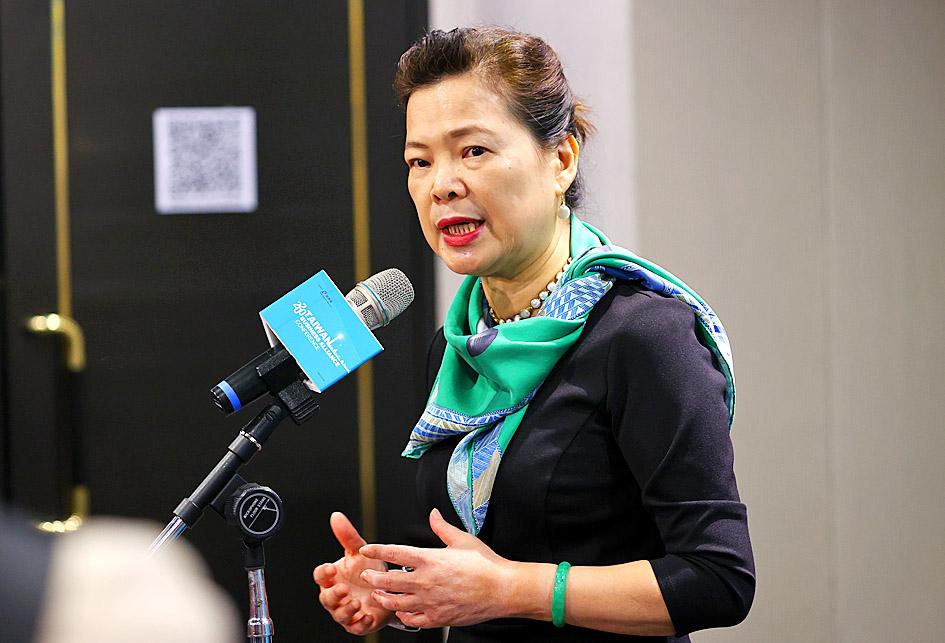The government’s “Invest in Taiwan” initiative might this year see NT$627.1 billion (US$21.7 billion) of investment pledges realized, with several firms raising stakes and two dropouts due to customer losses, Minister of Economic Affairs (MOEA) Wang Mei-hua (王美花) said yesterday.
Wang made the statement at the monthly meeting of the Third Wednesday Club, a local trade group featuring the top 100 firms of each business sector.
Since early last year, the government has launched three programs intended to help local companies grapple with US-China trade rows and the COVID-19 pandemic, mainly through moving production lines back to Taiwan.

Photo: CNA
Thus far, the ministry has received NT$1.13 trillion of investment pledges, with NT$251.3 billion invested last year and NT$375.8 million to be fulfilled by the end of this year, Wang said, adding that investments have for example been made by motherboard maker Gigabyte Technology Co (技嘉), cloud computing equipment supplier Wiwynn Corp (緯穎科技), communications solutions provider Accton Technology Corp (智邦科技) and networking equipment supplier Wistron NeWeb Corp (啟碁科技), among others.
Local firms have been moving high-end manufacturing facilities home to diversify investment risks as the US and China decouple trade ties. The restructuring allowed local firms to benefit from order transfers when China and ASEAN member countries came under lockdown earlier this year to fight the COVID-19 outbreak.
Packaging specialist Taiwan Lamination Industries Inc (台灣積層工業), Highlight Tech Corp (日揚科技) and Wistron NeWeb have increased investments to meet growing demand for their products, Wang said.
Two companies have called off investment plans after their top customer, China’s Huawei Technologies Co (華為), canceled orders, she said.
As of Friday last week, the government had this year given its approval to 389 companies that pledged to invest NT$284.9 billion and created 24,821 jobs in Taiwan, Wang said.
Taichung emerges as the biggest investment destination, while Taoyuan enjoys the most new jobs, she said.
Wang said that local companies should tap business opportunities in the green energy sector, following the global trend.
In Taiwan, companies that consume the most electricity would be required to purchase equitable amounts of green energy, she said.
Contract chipmaker Taiwan Semiconductor Manufacturing Co (台積電) announced that it would sign a 20-year contract with Orsted Taiwan Ltd (沃旭能源) to purchase all the electricity generated by its offshore wind farms after commercial operations start in 2025 or 2026.
Wang said that an uptick in COVID-19 infections worldwide dims the chance for Taiwan to ease travel restrictions anytime soon.
“I know border controls and mandatory quarantine create great inconvenience for businesses, but the spikes in virus infections worldwide require caution,” Wang said.

NEW IDENTITY: Known for its software, India has expanded into hardware, with its semiconductor industry growing from US$38bn in 2023 to US$45bn to US$50bn India on Saturday inaugurated its first semiconductor assembly and test facility, a milestone in the government’s push to reduce dependence on foreign chipmakers and stake a claim in a sector dominated by China. Indian Prime Minister Narendra Modi opened US firm Micron Technology Inc’s semiconductor assembly, test and packaging unit in his home state of Gujarat, hailing the “dawn of a new era” for India’s technology ambitions. “When young Indians look back in the future, they will see this decade as the turning point in our tech future,” Modi told the event, which was broadcast on his YouTube channel. The plant would convert

‘SEISMIC SHIFT’: The researcher forecast there would be about 1.1 billion mobile shipments this year, down from 1.26 billion the prior year and erasing years of gains The global smartphone market is expected to contract 12.9 percent this year due to the unprecedented memorychip shortage, marking “a crisis like no other,” researcher International Data Corp (IDC) said. The new forecast, a dramatic revision down from earlier estimates, gives the latest accounting of the ongoing memory crunch that is affecting every corner of the electronics industry. The demand for advanced memory to power artificial intelligence (AI) tasks has drained global supply until well into next year and jeopardizes the business model of many smartphone makers. IDC forecast about 1.1 billion mobile shipments this year, down from 1.26 billion the prior

People stand in a Pokemon store in Tokyo on Thursday. One of the world highest-grossing franchises is celebrated its 30th anniversary yesterday.

Zimbabwe’s ban on raw lithium exports is forcing Chinese miners to rethink their strategy, speeding up plans to process the metal locally instead of shipping it to China’s vast rechargeable battery industry. The country is Africa’s largest lithium producer and has one of the world’s largest reserves, according to the US Geological Survey (USGS). Zimbabwe already banned the export of lithium ore in 2022 and last year announced it would halt exports of lithium concentrates from January next year. However, on Wednesday it imposed the ban with immediate effect, leaving unclear what the lithium mining sector would do in the